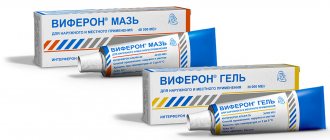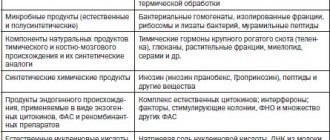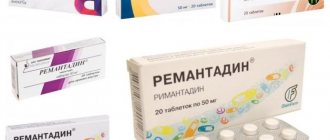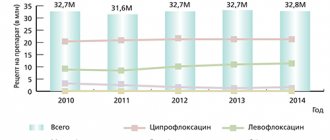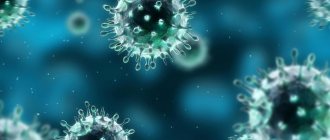Amiksin® is a modern antiviral drug, an inducer of interferon formation. Enhances the production of antibodies during ARVI. Maximum activity is already in the first 24 hours.
Trade name of the drug: Amiksin® International nonproprietary name: Tiloron Chemical name: 2,7-bis-[2(diethylamino)-ethoxy]-fluoren-9-one dihydrochloride Dosage form of the drug: film-coated tablets
Description Composition per tablet Pharmacological properties Indications for use Contraindications Use during pregnancy and breastfeeding Method of administration and dosage Side effects Overdose Interaction with other drugs Effect on the ability to drive vehicles and machinery Release form Expiration date Storage conditions Dispensing conditions from pharmacies Name and address of the manufacturer/organization receiving consumer complaints
Composition per tablet
Tiloron - 60 mg or 125 mg.
Excipients: core: potato starch - 25,500 mg or 46,000 mg, microcrystalline cellulose - 60,000 mg or 120,000 mg, povidone-K30 (kollidon 30) - 1,500 mg or 3,000 mg, calcium stearate - 1,500 mg or 3,000 mg, croscarmellose sodium ( primellose ) – 1,500 mg or 3,000 mg; shell: hypromellose (hydroxypropyl methylcellulose) – 3.4050 mg or 6.8100 mg, titanium dioxide – 1.7815 mg or 3.5630 mg, macrogol-4000 (polyethylene glycol-4000) – 0.4565 mg or 0.9130 mg, polysorbate -80 (Tween-80) – 0.0570 mg or 0.1140 mg, quinoline yellow dye (E 104) – 0.1235 mg or 0.2470 mg, sunset yellow dye (E 110) – 0.1765 mg or 0.3530 mg.
Pharmacotherapeutic group: antiviral immunostimulating agent – inducer of interferon formation.
ATX code: J05AX
Composition and release form
Film-coated tablets - 1 tablet.
tilorone - 0.06 g excipients: basic magnesium carbonate; PVP; calcium stearate; Aerosil; Vaseline oil; sugar; talc; tropeolin O; titanium dioxide; gelatin; beeswax in polymer jars of 6 or 10 pcs.; in a cardboard pack 1 jar. Film-coated tablets - 1 tablet. tilorone - 0.125 g excipients: basic magnesium carbonate; PVP; calcium stearate; Aerosil; Vaseline oil; sugar; talc; tropeolin O; titanium dioxide; gelatin; beeswax in polymer jars of 6 or 10 pcs.; in a cardboard pack 1 jar.
Pharmacological properties
Pharmacodynamics. A low-molecular-weight synthetic interferon inducer that stimulates the formation of all types of interferons in the body (alpha, beta, gamma and lambda). The main producers of interferon in response to the administration of tilorone are intestinal epithelial cells, hepatocytes, T-lymphocytes, neutrophils and granulocytes. After taking the drug orally, the maximum production of interferon is determined in the sequence intestines - liver - blood after 4-24 hours. Amiksin® has an immunomodulatory and antiviral effect. In human leukocytes it induces the synthesis of interferon. It also stimulates bone marrow stem cells, depending on the dose, enhances antibody formation, reduces the degree of immunosuppression, and restores the ratio of T-suppressors and T-helpers. The drug is effective against various viral infections, including influenza viruses, other acute respiratory viral infections, hepatitis viruses and herpes viruses. The mechanism of antiviral action is associated with inhibition of the translation of virus-specific proteins in infected cells, as a result of which viral reproduction is suppressed.
Pharmacokinetics. After oral administration, Amiksin® is rapidly absorbed from the gastrointestinal tract. Bioavailability – 60%. About 80% of the drug binds to plasma proteins. The drug is excreted almost unchanged through the intestines (70%) and through the kidneys (9%). Half-life (T1/2) – 48 hours. The drug does not undergo biotransformation and does not accumulate in the body.
special instructions
Amiksin can be purchased at a pharmacy without a doctor's prescription. Should be stored at temperatures up to 25 degrees away from children. Avoid exposure to light.
Shelf life – 36 months.
Many people are interested in the question of whether Amiksin is an antibiotic. The medicine does not belong to the group of antibiotics, but is an immunomodulatory drug.
Before taking the medicine, you should consider its compatibility with alcohol. The drug should not be taken in parallel with alcohol, since the latter reduces the effect of the active substances, which is why the desired result will not be achieved.
Does not affect the ability to drive vehicles and other dangerous machinery.
The drug can be used in parallel with antimicrobial agents and antibiotics.
Directions for use and doses
Amiksin® is taken orally after meals.
For children from 7 to 18 years: For uncomplicated forms of influenza and other acute respiratory viral infections - 60 mg 1 time per day on the 1st, 2nd and 4th day from the start of treatment. The course dose is 180 mg (3 tablets).
For adults (over 18 years old). For the treatment of influenza and other acute respiratory viral infections - 125 mg per day for the first 2 days of treatment, then 125 mg after 48 hours. The course dose of Amiksin® is 750 mg (6 tablets).
For the prevention of influenza and other acute respiratory viral infections - 125 mg once a week for 6 weeks. Per course - 750 mg (6 tablets).
For the treatment of herpes, cytomegalovirus infections - the first two days, 125 mg, then after 48 hours, 125 mg. Course dose – 1.25–2.5 g (10–20 tablets).
When treating influenza and other acute respiratory viral infections, if symptoms of the disease persist for more than 4 days, you should consult a doctor
Indications for use of Amiksin
Amiksin has an immunomodulatory and antiviral effect.
Amiksin is an antiviral drug, an inducer of interferon synthesis. Used in adults for the treatment of viral hepatitis A, B, C, herpes and CMV infections, in complex therapy: infectious-allergic and viral encephalomyelitis (multiple sclerosis, leukoencephalitis, uveoencephalitis), chlamydial infections of the urogenital and respiratory tract; prevention of influenza and ARVI. In children over 7 years of age, Amiksin is used to treat influenza and other acute respiratory viral infections.
What you need to know about the drug Amiksin
Since Amiksin belongs to the group of antiviral drugs and is prescribed for the treatment of colds, it, like any other representatives from a similar pharmacological group, exhibits its greatest therapeutic effectiveness at the very beginning of the onset of the disease.
You also need to know that this product must be stored correctly in order to prevent a shortening of its shelf life. In a dry place at an air temperature not exceeding 30°C. And definitely in a place where there is no access for children.
What are the side effects of Amiksin?
The drug is usually well tolerated and there are rarely any significant side effects. Among those that may rarely appear are:
- pain and/or discomfort in the upper abdomen, which is accompanied by bloating, indigestion, rapid satiety, burning pain - these symptoms are called dyspepsia;
- trembling in the body (chills);
- hypersensitivity reactions to the composition of the drug.
If you experience any new and not described above symptoms after taking Amixin, it is advisable to consult a doctor for advice.
Amiksin, tablets 125 mg, 10 pcs.
Manufacturer
Pharmstandard-Leksredstva, Russia
Compound
Tilorone - 60.0 mg or 125.0 mg.
Excipients:
core: potato starch - 25,500 mg or 46,000 mg, microcrystalline cellulose - 60,000 mg or 120,000 mg, povidone (povidone K30) - 1,500 mg or 3,000 mg, calcium stearate - 1,500 mg or 3,000 mg, croscarmellose (croscarmellose sodium) - 1.5 00 mg or 3,000 mg;
shell: hypromellose (hydroxypropyl methylcellulose) - 3.4050 mg or 6.8100 mg, titanium dioxide - 1.7815 mg or 3.5630 mg, macrogol (polyethylene glycol-4000) - 0.4565 mg or 0.9130 mg, polysorbate-80 (Tween-80) - 0.0570 mg or 0.1140 mg, quinoline yellow dye (E 104) - 0.1235 mg or 0.2470 mg, sunset yellow dye (E 110) - 0.1765 mg or 0, 3530 mg.
pharmachologic effect
ATX code: J05AX
Pharmacological properties
Pharmacodynamics.
Low molecular weight synthetic interferon inducer that stimulates the formation of all types of interferons in the body (alpha, beta, gamma and lambda).
The main producers of interferon in response to the administration of tilorone are intestinal epithelial cells, hepatocytes, T-lymphocytes, neutrophils and granulocytes. After oral administration, the maximum production of interferon is determined in the sequence intestine - liver - blood after 4-24 hours. Amiksin® has an immunomodulatory and antiviral effect.
According to experimental studies, after a single oral administration of the drug Amiksin® in a dose equivalent to the maximum daily dose for humans, the maximum concentration in the lung tissue of interferon lambda is determined after 24 hours, interferon alpha - after 48 hours.
Induction of interferon lambda in lung tissue helps to increase antiviral protection of the respiratory tract during influenza and other respiratory viral infections.
Induces the synthesis of interferon in human leukocytes. Stimulates bone marrow stem cells, depending on the dose, enhances antibody formation, reduces the degree of immunosuppression, restores the ratio of T-suppressors and T-helpers.
Effective against various viral infections, including influenza viruses, other acute respiratory viral infections, hepatitis viruses and herpes viruses. The mechanism of antiviral action is associated with inhibition of the translation of virus-specific proteins in infected cells, as a result of which viral reproduction is suppressed.
Pharmacokinetics.
After oral administration, it is quickly absorbed from the gastrointestinal tract. Bioavailability - 60%. About 80% of the drug binds to plasma proteins. The drug is excreted almost unchanged through the intestines (70%) and through the kidneys (9%). The half-life (T1/2) is 48 hours. The drug does not undergo biotransformation and does not accumulate in the body.
Indications
As part of complex therapy:
In children from 7 to 18 years old:
- treatment of influenza and other acute respiratory viral infections (ARVI).
In adults:
— treatment of influenza and other acute respiratory viral infections;
- treatment of herpetic infection.
Prevention of influenza and other acute respiratory viral infections in adults.
Use during pregnancy and breastfeeding
The use of the drug during pregnancy is contraindicated. If it is necessary to use the drug during lactation, breastfeeding should be discontinued.
Contraindications
Hypersensitivity to tilorone or any other component of the drug. Pregnancy and breastfeeding period. Children up to 7 years of age (for a dosage of 60 mg), children up to 18 years of age (for a dosage of 125 mg).
Side effects
Allergic reactions, dyspepsia, short-term chills are possible. If any of the side effects indicated in the instructions get worse, or you notice any other side effects not listed in the instructions, tell your doctor.
Interaction
Compatible with antibiotics and drugs for traditional treatment of viral and bacterial diseases. No clinically significant interaction of Amiksin® with antibiotics and traditional treatments for viral and bacterial diseases has been identified.
How to take, course of administration and dosage
Amiksin® is taken orally after meals.
For children from 7 to 18 years old:
For uncomplicated forms of influenza and other acute respiratory viral infections - 60 mg 1 time per day on the 1st, 2nd and 4th day from the start of treatment. The course dose is 180 mg (3 tablets).
For adults:
For the treatment of influenza and other acute respiratory viral infections - 125 mg per day for the first 2 days of treatment, then 125 mg after 48 hours. Per course - 750 mg (6 tablets).
For the prevention of influenza and other acute respiratory viral infections - 125 mg once a week for 6 weeks. Per course - 750 mg (6 tablets).
For the treatment of herpes infection - the first two days, 125 mg, then after 48 hours, 125 mg. The course dose is 1.25-2.5 g (10-20 tablets).
When treating influenza and other acute respiratory viral infections, if symptoms of the disease persist for more than 4 days, you should consult a doctor.
Overdose
To date, cases of overdose of the drug Amiksin are unknown.
Special instructions
Impact on the ability to drive vehicles and machinery
The drug does not have a negative effect on the ability to drive vehicles and engage in other potentially hazardous activities that require increased concentration and speed of psychomotor reactions.
Release form
Film-coated tablets.
Storage conditions
In a dry place, protected from light, at a temperature not exceeding 30 °C
Best before date
3 years
Active substance
Tiloron
Dosage form
pills
Purpose
For adults
Indications
Tuberculosis, Colds, Influenza, Herpes, Chlamydia, Cytomegalovirus infection, Prevention of influenza and colds, Hepatitis
Information in the State Register of Medicines
Go
Barcode and weight
Barcode: 4601669009586, - Weight: 0.024 kg
Interaction of Amiksin with other drugs and substances
Amiksin can be used together with groups of antibiotics and other antiviral agents, since with their simultaneous use no pharmacodynamic (mechanism of action) and pharmacokinetic (distribution and excretion of the drug in the body) interactions have been established.
In order to find out other possible interactions of Amiksin with various pharmacological drugs and any substances, it is recommended to consult a doctor.

